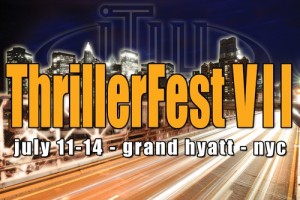I would love going to an actors’ convention where I could have dinner with Sandra Bullock, take an acting class from Michael Caine, audition for a role in the next Spielberg movie, and share laughs at the bar with the cast of Castle. Won’t ever happen. It sounds too good to be true because it is. But that kind of dream conference does exist for thriller writers and fans. It’s called ThrillerFest, which will be held in New York City on July 10-13, 2013.
The attendees this week include writers who live on the New York Times bestseller list. The five spotlight guests alone–R.L. Stine, Anne Rice, Michael Connelly, Michael Palmer, and T. Jefferson Parker–have sold somewhere in the neighborhood of 500 million books. And everywhere you look at the conference, you’re blinded by the star wattage: Lisa Gardner, Steve Berry, Lee Child, Catherine Coulter, Douglas Preston, Heather Graham, Brad Meltzer, Joseph Finder. It’s as if you could get into the Oscars merely by paying a registration fee.
But the really amazing thing about ThrillerFest is that you get to meet and talk to these people, not just ogle them from afar. When I was a newbie unpublished author at the inaugural ThrillerFest in Phoenix seven years ago, I didn’t know a soul. At the opening cocktail reception, I spent most of the time ambling about, listening in on snippets of conversation as I tried not to spill red wine down my shirt. Then I spotted Jon Land, an author I’d been reading for years. I gathered up my courage and nervously introduced myself, telling him that I was a huge fan. To my shock he asked me to join his group for dinner, where we had a fantastic time. In what other entertainment medium could that happen?
While I’ve mentioned some of the big names you can hobnob with, there are also plenty of up and coming writers who attend, some of whom will be household names in a few years. Imagine getting to know Dan Brown or Stephenie Meyer just before they hit it big. And because I’ve gone to the convention every year, I’m lucky to count many of these future publishing phenoms as friends.
ThrillerFest is also a great deal for unpublished authors looking to break into the business. Through an event called AgentFest, aspiring writers can pitch their novels to a who’s who of the biggest agents in publishing. I was fortunate enough to find my own agent there. Before I met her my manuscripts barely got a nibble. Now I’m the director of AgentFest, my sixth thriller, THE LOCH NESS LEGACY, has just come out, and my novels are published in 22 languages. If I hadn’t attended ThrillerFest, who knows what I’d be doing?
For those looking to hone their writing skills, CraftFest offers a wealth of knowledge that is available nowhere else. You can actually take writing classes from legendary authors like Connelly, famed for books such as THE POET and THE LINCOLN LAWYER, and David Morrell, the creator of Rambo. The biggest problem is the information overload you might experience trying to cram every nugget of wisdom into your brain.
The best part of the conference is hanging out with these authors at the bar, the central gathering place. At first you’ll regard them with awe that they have descended from the heavens to walk amongst us. Then when you’re introduced to them, you’ll realize that they’re just people, too–although extremely talented, friendly, fascinating people. They’re happy to greet fans and share their insights about the business. Buying them a drink doesn’t hurt, either, though this being New York you’d better hang onto your wallet for a bumpy ride.
If you do get some of these writers liquored up, don’t be surprised if you laugh yourself silly as they spin wild tales of publishing wackiness, crazed fans, and book tours gone wrong. After all, these people know how to tell a story.

